Словообразование.
Структура
слова и ее изменение
Иногда бывают такие ситуации, когда в тексте встречается
незнакомое английское слово, а словаря под рукой нет. Можно, конечно,
попытаться понять из контекста, что оно означает. Но понять его значение нам
также помогут правила словообразования.
Новые
слова усваиваются постепенно. Чаще всего, сначала мы только понимаем их в
текстах или чужой речи, а уже потом начинаем активно использовать в своей.
Поэтому освоение новой лексики – процесс длительный и требует от ученика
терпения, активной практики чтения, слушания и работы со словарем.
Один
из методов быстро расширить свой словарный запас – освоить способы
словообразования в английском языке. Поняв принципы, по которым строятся слова,
можно из уже известного слова вывести значения его однокоренных слов.
Строительный
материал для каждого слова – это корень, приставки и суффиксы. Корень – это та
часть слова, которая несет основной смысл. Слово без корня не может
существовать. Тогда как приставки и суффиксы – необязательная часть, однако
прибавляясь к корню, именно они помогают образовать новые слова. Поэтому,
описывая словообразование в английском, мы будем разделять приставочные и
суффиксальные способы.
Все
приставки и суффиксы обладают собственным значением. Обычно оно довольно
размыто и служит для изменения основного значения слова. Когда к корню
добавляется приставка или суффикс (или же оба элемента), то их значение
прибавляется к значению корня. Так получается новое слово.
Образование
новых слов может приводить не только к изменению значения, но и менять части
речи. В этой функции чаще выступают суффиксы. Прибавляясь к корню, они
переводят слово из одной части речи в другую, например, делают прилагательное
из глагола или глагол из существительного.
Так,
от одного корня может образоваться целая группа, все элементы которой связаны
между собой. Поэтому словообразование помогает изучающим английский видеть
смысловые отношения между словами и лучше ориентироваться в многообразии
лексики.
Получить
новое слово можно не только за счет приставок и суффиксов. Еще один способ –
это словосложение, при котором в одно слово объединяются два корня, образуя
новый смысл. Кроме того, к словообразованию относится сокращение слов и
создание аббревиатур.
Приставки
как способ словообразования в английском
Приставка
(также употребляется термин «префикс») – элемент слова, который ставится перед
корнем. Приставочное словообразование английский язык редко использует для
смены частей речи (в качестве исключения можно назвать префикс «en-» / «em-»
для образования глаголов). Зато приставки активно используются для изменения
значения слова. Сами префиксы могут иметь различные значения, но среди них
выделяется большая группа приставок со схожей функцией: менять смысл слова на
противоположный.
1.
Приставки с отрицательным значением:
·
un-:
unpredictable (непредсказуемый), unable (неспособный)
·
dis-:
disapproval (неодобрение), disconnection (отделение от)
·
im-,
in-, il -,ir-: inactive (неактивный), impossible (невозможный), irregular
(нерегулярный), illogical (нелогичный). То, какая из этих приставок будет
присоединяться к слову, зависит от следующего за ней звука. «Im-» ставится
только перед согласными «b», «p», «m» (impatient — нетерпеливый). «Il-»
возможно только перед буквой «l» (illegal — незаконный), «ir-» – только перед
«r» (irresponsible — безответственный). Во всех остальных случаях употребляется
приставка «in-» (inconvenient – неудобный, стесняющий).
·
mis-:
misfortune (несчастье, беда). Приставка «mis-» может использоваться не только
для образования прямых антонимов, но и иметь более общее значение
отрицательного воздействия (misinform — дезинформировать, вводить в
заблуждение, misunderstand — неправильно понять).
2.
Другие приставочные значения
·
re-:
rebuild (отстроить заново, реконструировать). Приставка описывает повторные
действия (rethink — переосмыслить) или указывает на обратное направление
(return — возвращаться).
·
co-:
cooperate (сотрудничать). Описывает совместную деятельность (co-author –
соавтор).
·
over-:
oversleep (проспать). Значение префикса — избыточность, излишнее наполнение
(overweight — избыточный вес) или прохождение определенной черты (overcome —
преодолеть).
·
under-:
underact (недоигрывать). Приставку можно назвать антонимом к приставке «over-»,
она указывает на недостаточную степень действия (underestimate —
недооценивать). Кроме того, приставка используется и в изначальном значении
слова «under» — «под» (underwear — нижнее белье, underground — подземка,
метро).
·
pre-:
prehistoric (доисторический). Приставка несет в себе идею предшествования
(pre-production — предварительная стадия производства).
·
post-:
post-modern (постмодернизм). В отличие от предыдущего случая, приставка
указывает на следование действия (postnatal – послеродовой).
·
en-,
em-: encode (кодировать). Префикс служит для образования глагола и имеет
значение воплощения определенного качества или состояния (enclose — окружать).
Перед звуками «b», «p», «m» приставка имеет вид «em-» (empoison — подмешивать
яд), в остальных случаях – «en-» (encourage — ободрять).
·
ex-:
ex-champion (бывший чемпион). Используется для обозначения бывшего статуса или
должности (ex-minister — бывший министр).
Образование
новых слов при помощи суффиксов
Суффиксы
занимают позицию после корня. За ними может также следовать окончание
(например, показатель множественного числа «-s»). Но в отличие от суффикса
окончание не образует слова с новым значением, а только меняет его
грамматическую форму (boy – мальчик, boys – мальчики).
По
суффиксу часто можно определить, к какой части речи принадлежит слово. Среди
суффиксов существуют и такие, которые выступают только как средство образования
другой части речи (например, «-ly» для образования наречий). Поэтому
рассматривать эти элементы слова мы будем в зависимости от того, какую часть
речи они характеризуют.
Словообразование
существительных в английском языке
Среди
суффиксов существительных можно выделить группу, обозначающую субъектов
деятельности и группу абстрактных значений.
1.
Субъект деятельности
·
-er,
-or: performer (исполнитель). Такие суффиксы описывают род занятий (doctor —
доктор, farmer — фермер) или временные роли (speaker — оратор, visitor —
посетитель). Могут использоваться и в качестве характеристики человека (doer —
человек дела, dreamer — мечтатель).
·
-an,
-ian: magician (волшебник). Суффикс может участвовать в образовании названия
профессии (musician — музыкант) или указывать на национальность (Belgian —
бельгийский / бельгиец).
·
-ist:
pacifist (пацифист). Этот суффикс описывает принадлежность к определенному роду
деятельности (alpinist – альпинист) или к социальному течению, направлению в
искусстве (realist — реалист).
·
-ant,
-ent: accountant (бухгалтер), student (студент).
·
-ee:
employee (служащий), conferee (участник конференции).
·
-ess
: princess (принцесса). Суффикс используется для обозначения женского рода
(waitress – официантка).
·
2.
Абстрактные существительные
Основа
этой группы значений – обозначение качества или состояния. Дополнительным
значением может выступать объединение группы людей и обозначение определенной
совокупности.
·
-ity:
activity (деятельность), lability (изменчивость).
·
-ance,
-ence, -ancy, -ency: importance (важность), dependence (зависимость), brilliancy (великолепие), efficiency (эффективность).
·
-ion,
-tion, -sion: revision (пересмотр, исправление), exception (исключение), admission (допущение), information (информация).
·
-ism:
realism (реализм). В отличие от суффикса «-ist» обозначает не представителя
некоторого течения, а само течение (modernism — модернизм) или род занятий
(alpinism — альпинизм).
·
-hood:
childhood (детство). Может относиться не только к состоянию, но и описывать
группу людей, форму отношений: brotherhood (братство).
·
-ure:
pleasure (удовольствие), pressure (давление).
·
-dom:
wisdom (мудрость). Также используется при обозначении группы людей, объединения
по некоторому признаку: kingdom (королевство).
·
-ment:
announcement (объявление), improvement (улучшение).
·
-ness:
darkness (темнота), kindness (доброта).
·
-ship:
friendship (дружба). К дополнительным значениям относится указание на титул
(lordship — светлость), умение (airmanship — лётное мастерство) или на
объединение круга людей определенными отношениями (membership — круг членов,
partnership — партнерство).
·
-th:
truth (правда), length (длина).
·
Словообразование
прилагательных в английском языке
·
-ful:
helpful (полезный). Указывает на обладание определенным качеством (joyful —
радостный, beautiful — красивый).
·
-less:
countless (бессчетный). Значение суффикса близко к отрицанию и характеризует
отсутствие определенного качества, свойства (careless — беззаботный). Этот
суффикс можно определить как антоним для «-ful» (hopeless — безнадежный, а
hopeful — надеющийся).
·
-able:
comfortable (комфортный). «Able» (способный) существует и как самостоятельное
прилагательное. Оно определяет значение суффикса – возможный для выполнения,
доступный к осуществлению (acceptable – приемлемый, допустимый, detectable –
тот, который можно обнаружить).
·
-ous:
famous (знаменитый), dangerous (опасный).
·
-y:
windy (ветреный), rusty (ржавый).
·
-al:
accidental (случайный), additional (добавочный).
·
-ar:
molecular (молекулярный), vernacular (народный).
·
-ant,
-ent: defiant (дерзкий), evident (очевидный).
·
-ary,
-ory: secondary (второстепенный), obligatory (обязательный).
·
-ic:
democratic (демократический), historic (исторический).
·
-ive:
creative (творческий), impressive (впечатляющий).
·
-ish:
childish (детский, ребяческий). Суффикс описывает характерный признак с негативной
оценкой (liquorish – развратный) или с ослабленной степенью качества (reddish —
красноватый). Кроме того, суффикс может отсылать к национальности (Danish —
датский).
·
-long:
livelong (целый, вечный). Такой суффикс обозначает длительность (lifelong — пожизненный)
или направление (sidelong — косой, вкось) и может принадлежать не только
прилагательному, но и наречию.
Словообразование
глаголов
Для
глагольных суффиксов сложно определить конкретные значения. Основная функция
таких суффиксов — перевод в другую часть речи, то есть само образование
глагола.
·
-ate:
activate (активизировать), decorate (украшать).
·
-ify,
-fy: notify (уведомлять), verify (проверять).
·
-ise,
-ize: summarize (суммировать), hypnotize (гипнотизировать).
·
-en:
weaken (ослабевать), lengthen (удлинять).
·
-ish:
demolish (разрушать), embellish (украшать).
Словообразование
наречий
·
-ly:
occasionally (случайно).
·
-wise:
otherwise (иначе). Обозначает способ действия (archwise — дугообразно).
·
-ward(s):
skyward/skywards (к небу). Обозначает
направление движения (northward — на север, shoreward — по направлению к
берегу).
Суффиксы:
таблица словообразования по частям речи
Приведенный
список суффиксов – это далеко не все возможности английского языка. Мы описали
наиболее распространенные и интересные случаи. Для того чтобы разобраться в
этом множестве вариантов и лучше усвоить образование слов в английском языке,
таблица резюмирует, для каких частей речи какие суффиксы характерны.
Поскольку
суффиксальное преобразование слов в английском языке различается по частям
речи, таблица разбита на соответствующие группы. Одни и те же суффиксы могут
добавляться к разным частям речи, но в результате они определяют, к какой части
речи принадлежит новое слово.
Объединение
суффиксов и приставок
Важная
характеристика словообразования – это его продуктивность. От одного корня можно
образовать целую группу слов, добавляя разные приставки и суффиксы. Приведем
несколько примеров.
·
Для
possible словообразование может выглядеть следующим образом: possible
(возможный) — possibility (возможность) — impossibility (невозможность).
·
Цепочка
переходов для слова occasion: occasion (случай) — occasional (случайный) —
occasionally (случайно).
·
Для
слова agree словообразование можно выстроить в цепочки с приставкой и без
приставки: agree (соглашаться) — agreeable (приемлемый / приятный) — agreeably
(приятно) — agreement (соглашение, согласие).
agree (соглашаться) — disagree (противоречить, расходиться в мнениях) —
disagreeable (неприятный) — disagreeably (неприятно) — disagreement
(разногласие).
Словосложение
и сокращение слов
Словосложение
— еще один способ образовать новое слово, хотя и менее распространенный. Он
основан на соединении двух корней (toothbrush — зубная щетка, well-educated —
хорошо образованный). В русском языке такое словообразование тоже встречается,
например, «кресло-качалка».
Если
корень активно используется в словосложении, то он может перейти в категорию
суффиксов. В таком случае сложно определить, к какому типу – суффиксам или
словосложению – отнести некоторые примеры:
·
-man:
fireman (пожарный), spiderman (человек—паук)
·
-free:
sugar-free (без сахара), alcohol-free (безалкогольный)
·
-proof:
fireproof (огнестойкий), soundproof (звукоизолирующий)
Помимо
объединения нескольких корней, возможно также сокращение слов и создание
аббревиатур: science fiction — sci-fi (научная фантастика), United States of
America – USA (Соединенные Штаты Америки, США).
Новые
слова без внешних изменений
К
особенности словообразования в английском языке относится и то, что слова могут
выступать в разных частях речи без изменения внешнего вида. Это явление
называется конверсией:
I
hope you won’t be angry with me — Надеюсь, ты не будешь на меня злиться (hope
– глагол «надеяться»).
I
always had a hope to return to that city — У меня всегда оставалась надежда
вернуться в этот город (hope – существительное «надежда»).
The
sea is so calm today — Море так спокойно сегодня (calm –
прилагательное «спокойный»).
With
a calm she realized that her life was probably at its end — Со спокойствием она
осознала, что ее жизнь, вероятно, подходила к концу (calm –
существительное «спокойствие, невозмутимость»).
I
beg you to calm down — Я умоляю тебя успокоиться (calm –
глагол «успокоиться»).
Слайд 1
Word formation 8-11
Слайд 2
Основные суффиксы прилагательных: Суффикс, обозначающий национальную принадлежность или слабую степень качества: — ese — ish Chinese ( китаец, китайский), Japanese ( японец, японский) Pole ( поляк) — Polish ( польский), Scott ( шотландец) — Scottish ( шотландский) red ( красный) — reddish ( красноватый), child ( ребенок) — childish ( ребячливый, детский)
Слайд 3
Суффиксы, образующие прилагательные от глаголов и обозначающие наличие качества: — ive – ent -ant to act ( действовать) — active ( активный), to talk ( разговаривать) – talkative ( разговорчивый) to differ ( различать) — different ( различный), to insist ( настаивать) — insistent ( настойчивый) to observe ( наблюдать, замечать) — observant ( наблюдательный, внимательный)
Слайд 4
Суффиксы, образующие прилагательные от существительных и обозначающие наличие качества, свойства: — ic -al — ful — ous — у base ( основа) — basic ( основной), economy ( экономика) — economic ( экономический) centre ( центр) — central ( центральный) culture ( культура) — cultural ( культурный), beauty ( красота) — beautiful ( красивый) peace ( мир) — peaceful ( мирный), fame ( слава) — famous ( знаменитый) cloud ( облако) — cloudy ( облачный), sun ( солнце) — sunny ( солнечный)
Слайд 5
Суффиксы, образующие прилагательные от различных частей речи и обозначающие а) качество, свойство: -а r у — огу element ( элемент) — elementary ( элементарный) illusion ( иллюзия) — illusory ( обманчивый, иллюзорный) б) способность что-либо сделать, состояние, качество: — able — ible to change ( изменить) — changeable ( изменчивый) to eat ( есть) — eatable ( съедобный), reason ( разум) — reasonable ( разумный) в) отсутствие качества : — less useless ( бесполезный), windless ( безветренный)
Слайд 6
суффиксы существительных и прилагательных Существительные: — ness, -ion, — ation , — ment , — ance , — ition Прилагательные: — al, -y, — ly , — ful , — ous , — tific 1) Прилагательное Существительное 1. luck y ( удачный) luck ( удача) 2. …… happiness ( счастье) 3. wonderful ( чудесный) …… 4. …… speed ( скорость) 5. greedy ( жадный) …… 6. …… friend ( друг) 7. …… danger ( опасность) 8. traditional ( традиционный) …… 9. …… science ( наука) 10. ill ( больной) …… 11. …… truth ( правда) 12. …… profession ( профессия) 13. …… business ( бизнес) 14. healthy ( здоровый) …… 15. …… wealth ( богатство)
Слайд 7
lucky ( удачный) scientific ( научный) happy ( счастливый) illness ( болезнь) wonder ( чудо) truthful ( правдивый) speedy ( скоростной) professional greed ( жадность) busy ( деловой) friendly ( дружелюбный) health ( здоровье) dangerous ( опасный) wealthy ( богатый) tradition ( традиция)
Слайд 8
Образуйте прилагательные с помощью суффиксов — ful и — less , переведите их на русский язык: Beauty, thank, hope, doubt, care, aim, use, shape, fruit, power, thought, harm, colour .
Слайд 9
Образуйте прилагательные с помощью суффиксов — able, — ible , переведите их на русский язык: Change, convert, prevent, break, compare, desire, profit, read, comfort, respect, expect.
Слайд 10
Найдите и выделите суффиксы в данных словах и определите, к какой части речи эти слова относятся: British, foolish, understandable, heartless, pitiless, successful, experiment, function, musician, socialist, artist, capitalism, professional, fundamental, industrial, doubtful, useful, different, treatment, creative, attractive, peaceful, dangerous, elementary, childish, active, economic, director, worker, passage, marriage, silence, freedom, kingdom.
Слайд 11
Заполните предложения прилагательными , образованными от существительных , данных в скобках, при помощи суффиксов – ful ,- ly ,-y 1. You must be…………………when you open the door. (CARE) 2. The countryside looks very………………….now. (COLOUR) 3. That was a very………………thing to do! (COWARD) 4. He has a…………………routine of exercises. (DAY) 5. She was…………………when I told her my plan. (DOUBT) 6. It was very………………..so I drove slowly. (FOG) 7. It’s nice meeting such a……………….person. (FRIEND) 8. He looked very…………………in that hat. (FUN) 9. They saw a…………………figure at the castle door. (GHOST) 10. Working on the car made her hands………………… (GREASE) 11. Let’s go for a………………walk in the fresh air! (HEALTH) 12. We’re………………….that they’ll agree to come. (HOPE) 13. Seeing all that food made me very……………….. (HUNGER) 14. She married a………………..businessman. (SUCCESS) 15. He looked…………………..when he heard the news. (THOUGHT) 16. You can trust her. She’s a very…………………girl. (TRUTH) 17. This map was very………………..on my holiday. (USE) 18. It was…………………to see him again. ( WONDER )
Тренировочные упражнения
Ex. 1. Переведите следующие слова, выделите в них суффиксы и префиксы:
Untrue, prehistoric, ultramodern, postwar, ex-champion, anti-body, decompose, decode, deform, depart, discover, disappearance, reread, reconstruct, coauthor, unequal, misunderstand, undress, disarm, anti-fascist, cooperation, co-existence, interaction, superhuman, ultra-violet.
Ex. 2. Определите, к какой части речи относятся следующие слова. Переведите их:
Achievement — achieve, resistance — resistant, assistance — assist — assistant, celebration — celebrate, difference — different, city — citizen, nation — national — nationality, measure — measurement, develop — development, act — active — activity, contain — container, discover — discovery — discoverer, literature — literary, graduate — graduation — undergraduate — post-graduate, educate — education, progress — progressive, act — action — activity — active, govern — governor — government.
Ex. З. Образуйте от данных глаголов существительные с помощью суффикса-ег или -or. Переведите на русский язык:
To lead, to write, to read, to visit, to speak, to sleep, to act, to direct, to conduct, to drive, to fight, to mine, to report, to sing, to skate, to swim, to teach, to travel, to sail, to invent, to found, to compose.
Ex. 4. Образуйте от данных слов существительные с помощью суффикса -ist, -ism, -ian. Переведите на русский язык:
Special, social, art, capital, economy, international, piano, technic, mathematics, statistics, politics, music, electric, Russia, Hungary, Canada, India.
Ex. 5. Образуйте от данных глаголов существительные с помощью суффикса -ment. Переведите на русский язык:
Develop, achieve, move, arrange, treat, state, improve, agree, equip, govern, require, measure, announce, pave.
Ex. 6. Образуйте прилагательные с помощью суффиксов -ful и -less,переведите их на русский язык:
Beauty, thank, hope, doubt, care, aim, use, shape, fruit, power, thought, harm, colour.
Ex. 7. Образуйте прилагательные с помощью суффиксов -able, -ible,переведите их на русский язык:
Change, convert, prevent, break, compare, desire, profit, read, comfort, respect, expect.
Ex. 8. Найдите и выделите суффиксы в данных словах и определите, к какой части речи эти слова относятся:
British, foolish, understandable, heartless, pitiless, successful, experiment, function, musician, socialist, artist, capitalism, professional, fundamental, industrial, doubtful, useful, different, treatment, creative, attractive, peaceful, dangerous, elementary, childish, active, economic, director, worker, passage, marriage, silence, freedom, kingdom.
Ex. 9. Образуйте глаголы с помощью суффикса -en:
Red, tight, soft, deep, short, dark, bright, weak, black, white, sweet, sharp, strength.
Ex. 10. Образуйте наречия с помощью суффикса -1у и переведите их:
Bad, first, part, quick, strong, short, silent, rapid, wide, extreme, cruel, kind, happy.
Ex. 11. Образуйте глаголы от данных существительных. Переведите их:
Turn, smile, smoke, snow, start, stay, step, stop, study, talk, visit, rest, air, paper, cover, handle, cause, watch, act, address, answer, brush, clean, cross, crowd, wave, wish, work, dance, doubt, dress, end, fight, help, hope, joke, laugh, lift, light, love, mind, paper, pencil, place, plan, play, post, reply, report, return, sail, show.
Ex. 12. Переведите на русский язык. Выделите словообразующие элементы. Определите, к какой части речи относятся данные слова:
React, reaction, reactor, reactivity; science, scientific, scientist; industry, industrial, industrious; cold, coldly, coldness; dark, darkness, darken; happy, happily, happiness, unhappy; equal, equally, unequal, equality; free, freedom, freely; attention, attentive, attentively; sun, sunny, sunless; care, careful, careless, carefully, carelessness; to differ, different, difference, indifferent; England, English, Englishman; fame, famous.
Ex. 13. Переведите следующие сложные слова:
Airport, armchair, bathroom, bedroom, bookcase, bookshelf, classroom, custom-house, dining-room, drawing-room, fireplace, folksong, gentleman, hairbrush, icebox, newspaper, notebook, postcard, post-office, raincoat, sportsman, sunshine, writing-table.
Ex. 14. Прочтите следующие пары слов, соблюдая ударения. Переведите их:
An accent — to accent, a contract — to contract, a content — to content, a contest — to contest, a convoy — to convoy, a convict — to convict, a perfect — to perfect, a record — to record.
Ex. 15. Определите, к каким частям речи относятся выделенные слова:
1. Не works as a teacher. 2. I saw one of his works at the exhibition. 3. I was waiting for your report. 4. They report the results of their experiment every Monday. 5. His report contains some of his thoughts about the experiment. 6.You’ll make progress if you work hard. 7. He thought about his new work. 8. I have a present for you. 9. I am busy at present. 10. He presented me with a book.
Ex. 16. Проанализируйте состав следующих слов. Определите части речи. Дайте начальную форму. Переведите слова:
Powerful, inventor, high-quality, network, demoralize, profitable, dislike, disagree, movement, shorten, incorrect, electricity, fruitful, fruitless, happiness, dangerous, noisy, sunny, rainy, badly, strongly, reading, teaching, rebuild, retell, leader, teacher, unhappy, unusual, translation, cooperation, schoolboy, icebreaker.
Ex. 17. Напишите сложные существительные, исходя из объяснений.
Например: A machine for drying hair – hair drier.
1. A thing for opening tins — … . 2. A machine for playing records — … . 3. A machine for mixing food — … . 4. A thing that times eggs (when they are boiling) — … . 5. Things for warming people’s legs — … . 6. Stuff that kills flies — … . 7. A liquid that removes paint — … . 8. A tool that opens bottles — … . 9. A thing for peeling potatoes — … . 10. A liquid for removing eye makeup — … . 11. Stuff for freshening the air — … .
Ex. 18. Напишите словосочетания по модели число+ существительное+существительное (! не забывайте что число и первое существительное соединяется дефисом и что это существительное обычно стоит в единственном числе)
Например: a walk lasting for three miles – a three-mile walk.
1. A girl who has just celebrated her sixteenth birthday — … . 2. A flight lasting for ten hours — … . 3. A note that is worth twenty pounds — … . 4. A language course that lasts four weeks — … . 5. A drive that takes three hours — … . 6. A meal that consists of three courses — … . 7. A holiday that lasts two weeks — … . 8. A delay at the airport that went on for two hours — … . 9. A letter that goes on for ten pages — … . 10. A university course that takes three years — … . 11. A prison sentence of ten years — … . 12. A hotel with five stars — … . 13. A speed limit of 30 miles an hour — … . 14. A house that was built two hundred years ago — … .
Ex. 19. Распределите прилагательные по трем группам: 1) люди, 2) места, 3) вещи:
Obstinate, unspoilt, hand-made, waterproof, easy-going, breathtaking, aggressive, deserted, overgrown, overcrowded, cunning, picturesque, arrogant, long-lasting, spoilt, automatic, accurate, artificial.
Ex. 20. Выберите слово с нужным по смыслу префиксом или суффиксом.
1. I know Jim Kerry is very popular but I find him totally childish / childlike. 2. I couldn’t work out whom the letter was from. The signature was childish / childlike.3. Sarah is so childish / childlike. She always plays trick on her friends. 4. It was wonderful to watch the tiny lambs playing. I got such childish / childlike pleasure from the experience. 5. Sophie is extremely sensitive / sensible at the moment. Anything you say seems to upset her. 6. Karen is not a very sensitive / sensibleperson. She wore high-heeled shoes for our four-mile walk. 7. I’ve never known her to tell a lie. She’s a very true / truthful person. 8. I can never watch sad films that are based on true / truthful a story. They always make me cry. 9. Susan is sointolerable / intolerant of other people. She never accepts anyone else’s opinion, and she always thinks she knows best. 10. I find Mark’s behaviour intolerable / intolerant. It’s unfair to be so selfish. 11. We’re having an economic / economicalcrisis at the moment. James has lost his job and I don’t know how we are going to pay the rent. 12. It’s more economic / economical to drive slowly. You can do a lot more miles to the gallop.
Ex. 21. Подберите к каждой тройке слов такое, чтобы с его помощью образовать составные существительные, используйте слова: board, green,paper, book, birthday, blood, rain, site, road, sports, ice, water, day, night,hand, case, sun, bag.
Например: camp…, building…, bomb… – campsite, building site, bomb-site.
1. …test, …pressure, …donor. 2. …fall, …melon, …skiing. 3. …house, …grocer, …salad. 4. …club, …mare, …shift. 5. brief…, suit…, book… . 6. paper…, plastic…, shoulder… . 7. …bow, …coat, …drop. 8. …shine, …rise, …set. 9. …works, …sign, …rage. 10. black…, floor…, notice… . 11. …light, …break, …dream. 12. …shake, …writing, …book. 13. …cube, …berg, …rink. 14. …cake, …present, …card. 15. …scape, …lady, …slide. 16. …car, …center, …ground. 17. address…, visitor’s…, note… .
Ex. 22. Дополните предложения сложными существительными в скобках (это могут быть и составные существительные, и существительные в притяжательном падеже в простой или аналитической форме).
1. Your coat is on the … (back, chair). 2. You’ve just spilt the … (milk, cat). 3. Canyou buy some … (paper, toilet). 4. I never listened to my … (advise, parents). 5. Can you buy a … (wine, bottle) to have with supper? 6. What did that … (road, sigh) say? Did you see it? 7. It’s such a mess in here. There are empty … (wine, bottles) everywhere. 8. The … (Prime Minister, duties) include entertaining heads of the state. 9. The … (my shoe, heel) has come off. 10. Can I borrow your …(brush, hair)? 11. What happened at the … (film, end)? 12. Here is … (today, news).13. Where is the nearest … (Metro, station)? 14. It’s my … (anniversary, parents, wedding) next week. 15. The … (company, success) is due to its efficiency. 16. I’ve got a … (fortnight, holiday) next month. 17. The … (government, economic policy) is confusing. 18. My children go to the local … (school, state). 19. The annual …(rate, inflation) is about 4 percent. 20. Are there any … (coffee, cups) in your bedroom? There are none in the kitchen. 21. Do you want a … (coffee, cup)?
Ex. 22. Заполните пропуски глаголом или существительным: advice – to advise, use – to use, abuse – to abuse, belief – to believe, relief – to relieve, grief – grieve, excuse – to excuse, breath – to breathe, half – to halve, house – to house, safe – to save, bath – to bathe.
1. It is my personal … that this man is innocent. 2. Let me listen to your chest. Take a deep … and say “Ah”. 3. You should put your valuables in the … . 4. Drug … is a terrible problem all over the world. 5. I know it isn’t good for my skin, but I love sun … . 6. I’ve been so worried about you! It’s such a … to see you at last! 7. “What are we going to do with this cake?” “Cut it in two. You take … and I’ll take … .” 8. Can you show me how to … this new coffee machine? 9. The refugees are … in temporary accommodation. 10. She apologizes for her behavior, and said it was because she’d had a busy day, but that’s no … for breaking all the plates. 11. People need time to … after the death of someone they love. 12. Take my … . Never marry for money. Marry for love.
Ex. 22. Напишите слово противоположное по значению, используя префикс
Kind, honest, credible, appear, fair, equal, pleased, continue, fasten, normal, employed, friendly, trust, professional, known, cover, safe, use, probable, important, emotional.
Тренировочные тесты WORDFORMATION (form: 8 -9).
Test 1.
1. This is the most . …. . . . . concert I‘ve ever been to. (Expense) 2. Her husband’s not a very……….person. (Patience) 3. Susan is very……….and wants to do well. (Ambition) 4. Show some…….…. Don’t you like the idea? (Enthuse) 5. Her problem is that she has not enough……..…in herself. (Confide) 6. Dan is really very…………, even rude sometimes. (Polite) 7. I haven’t been to the cinema………… . (Recent) 8. Mary………… and they never s aw her again. (Appear)
Test 2.
1.Most people have no real……… in ghosts.(Believe) 2. Mark Twain wrote many……… stories. (Humour) 3. The children’s…..… at the concert was excellent. (Behave) 4. Rita asked for a ……… and cashier gave her one. (Receive) 5. Do you think you have the……… to pass the exam? (Able) 6. You need a lot of ……… to write a good story. (Imagine) 7. I read an interesting …… in the newspaper. (Advertise) 8. Their friendship began in their …….. . (Child)
Test 3.
1. I’m telling you the …..…! I swear! (True) 2. Your composition isn’t good enough. You’ll have to …..… it. (Write) 3. Did you know Ann used to work as a …….. when she was younger? (Wait) 4. They need your …..… before they can do it. (Sign) 5. It all happened quite…..… . I didn’t have time to think. (Sudden) 6. I’m sure his new film is going to be a huge…… .(Succeed) 7. Did Paul give an ……… for his actions? (Explain) 8. The ……… of the village are all very kind. (Inhabit)
Test 4.
1. The leaflet gives a brief……… of each place. (Describe) 2. Can you give us a quick ……… of how it works? (Explain) 3. Olga broke the vase during an ……… with her husband. (Argue) 4. Gold is a very ……… metal. (Value) 5. Peter began to feel depressed and …..… . (Help) 6. His book is the result of years of ……… research. (Care) 7. This snake is not ……… at all. (Danger) 8. The bright flowers make the room look…….. . (Cheer)
Test 5.
1. Teenagers nowadays are more interested in ……… problems. (Globe) 2. Have you seen the new Levi ..…… on TV? (Advertise) 3. I looked everywhere but I couldn’t find him. He’s ……… (Appear) 4. It’s very…..… to drink and drive. (Danger) 5. Can you give me some more …… about this adventure holiday? (Inform) 6. We need to put up some …… for tonight’s party. (Decorate) 7. The weather today will be cold and…….. . (Wind) 8. Margarita was very ……… with the service. (Satisfy)
Test 6.
1. They put a lot of ..…… on him to agree to their demands. (Press) 2. I’ve had three…… nights and l feel exhausted. (Sleep) 3. If you have problems with your ………, see a doctor. (Circulate) 4. I’m feeling very …… today. I think I’ll go for a run. (Energy) 5. Remember that ..…… are also human. (Examine) 6. His nose was quite …… for days after he’d it pierced. ( Pain) 7. There are a lot of …… restaurants in this area. (Fashion) 8. Although she isn’t beautiful, most men find her quite……… (Attract).
Test 7.
1.The food was completely …… ; he was a useless cook .(Taste) 2. There were over 500 ……to the temple every day .(Visit ) 3. You can’t hope to win the race without any …….… .(Train) 4. In spite of her …….…,Jane continued her journey .(Hungry ) 5.Hard as he tried , he was unable to find …… .(Solve ) 6.I ..…… speaking , I don’t think Latin is a useful subject .(Person) 7.You need to organize your time more …….… (Efficient )
Test 8.
1. Stories are more ………. than lists of words .(Memory ) 2. His exam results were very …… . (Please ) 3. Passing exams will help you to get a ……job .(Good ) 4. You should revise on a regular ……… (Base ) 5. There are books that are specially …..….for foreign learners.(Simple ) 6. A degree is a very useful……….to have .(Qualify )7. I hope you will take into ……… what I have just said to you .(Consider ) 8. This new book had many beautiful …..…in it .(illustrate )
Test 9.
1.My aunt became …..….when she went to America. (Fame) 2.Paul sings …….; I’m surprised he isn’t a professional singer. (Beauty) 3.I was …….to see all my old friends again. (Delight ) 4.They bought some …… for their new house. (Furnish ) 5. She lives in a really ……mansion in the suburbs. (Luxury ) 6. Are you sitting ……. in that chair ? (Comfort ) 7.Everyone was nervous about the ……’s visit. (Inspector) 8.Our teacher has a really strong ……. . (Person) 9.His father has the best …… of ancient coins. (Collect)
Test 10.
1.The teacher wanted to know what my greatest …….(Ambitious) 2.I..……ever go to the theatre. I don’t like it .(Hard ) 3.Marina has a very …… manner , which I appreciate .(Relax) 4.Her son took part in the world ………last year .(Champion) 5.I was ……….when victor said I was beautiful.(Flatter) 6. Julia got a ………for best leading actress .(Nominate ) 7.She’s a very ………thinker .(Origin) 8.Her friend is very ……….! You can trust him .(Rely)
Ответы к тренировочным тестам. Test 1. 1. Expensive 2. Patient 3.Ambitious 4.Enthusiasm 5. Confidence 6.Impolite 7.Recently 8.Disappeared Test 2. 1. Belief 2. Humorous 3. Behaviour 4. Receipt 5. Ability 6. Success7. Advertisement 8. Childhood Test 3. 1. Truth 2. Rewrite 3. Waitress 4. Signature 5. Suddenly 6. Success 7.Explanation 8. Inhabitants Test 4. 1. Description 2. Explanation 3. Argument 4. Valuable 5. Helpless 6. Careful 7. Dangerous 8. Cheerful Test 5. 1. Global 2. Advertisement 3. Disappeared 4. Dangerous 5. Information 6. Decorations 7. Windy 8. Satisfied Test 6. 1. Pressure 2. Sleepless 3. Circulation 4. Energetic 5. Examiners 6.Painful Test 7. 1.Tasteless 2. Visitors 3.Training 4 . Hunger 5. Solution 6. Personally7. Efficiently Test 8. 1. Memorable 2. Pleasant 3. Better 4. Basis 5. Simplified 6. Qualification 7. Consideration 8. ILLustrations Test 9. 1. Famous 2. Beautifully 3. Delighted 4. Furniture 5. Luxurious 6. Comfortably 7. Inspector 8. Personality 9. Collection 10. Test 10. 1. Ambition 2. Hardly 3. Relaxed 4. Championship 5. Flattered 6. Nomination 7. Original 8. Reliable
Урок 41. Английский язык 8 класс ФГОС
В уроке рассмотрены все способы английского словообразования. Особое внимание уделяется образованию новых слов с помощью суффиксов -tion, -al. В практический блок включено задание на исправление ошибок в словах с этими суффиксами. Короткая шуточная история на экологическую тему включает много слов с разными типами словообразования, которые учащимся необходимо определить.



Предыдущий урок 40
Quiz. Ecological problems
Следующий урок 42
Your contribution to environment protection
Получите полный комплект видеоуроков, тестов и презентаций
Английский язык 8 класс ФГОС
Комментарии
0
Чтобы добавить комментарий зарегистрируйтесь или войдите на сайт
- Главная
- Разное
- Образование
- Спорт
- Естествознание
- Природоведение
- Религиоведение
- Французский язык
- Черчение
- Английский язык
- Астрономия
- Алгебра
- Биология
- География
- Геометрия
- Детские презентации
- Информатика
- История
- Литература
- Математика
- Музыка
- МХК
- Немецкий язык
- ОБЖ
- Обществознание
- Окружающий мир
- Педагогика
- Русский язык
- Технология
- Физика
- Философия
- Химия
- Шаблоны, фоны, картинки для презентаций
- Экология
- Экономика
Содержание
-
1.
Презентация для 8 класса на тему Словообразование -
2.
Word formation How to build words -
3.
Слайд 3 -
4.
Слайд 4 -
5.
Слайд 5 -
6.
un, — in, — im, — disityer/oree encesion -
7.
-ance Important-importanceer/orTo buy-buyerTo direct-directorTo visit – visitorTo -
8.
Form nouns from verbs, adjectives and nounsImprove -
9.
Form nouns from verbs, adjectives and nounsImprove -
10.
He achieved a great………(achieve)He made the right……..(decide)It -
11.
Cinquain1 line — one noun expressing the -
12.
Answer the questionsWhat did you study in -
13.
What What would you like the most in the English lesson? -
14.
english secret.ruПравила чтения в английском языкеПравила чтения -
15.
Слайд 15 -
16.
Make up as many words as possible -
17.
Possible — impossible (невозможный), possibility (возможность), impossibility -
18.
What words do these words come from? -
19.
Add negative prefixes to the -
20.
Слайд 20
Word formation How to build words
Слайд 1 What is it? When is it used? How it’s called?
un, — in, — im, — dis
ity
er/or
ee
sion
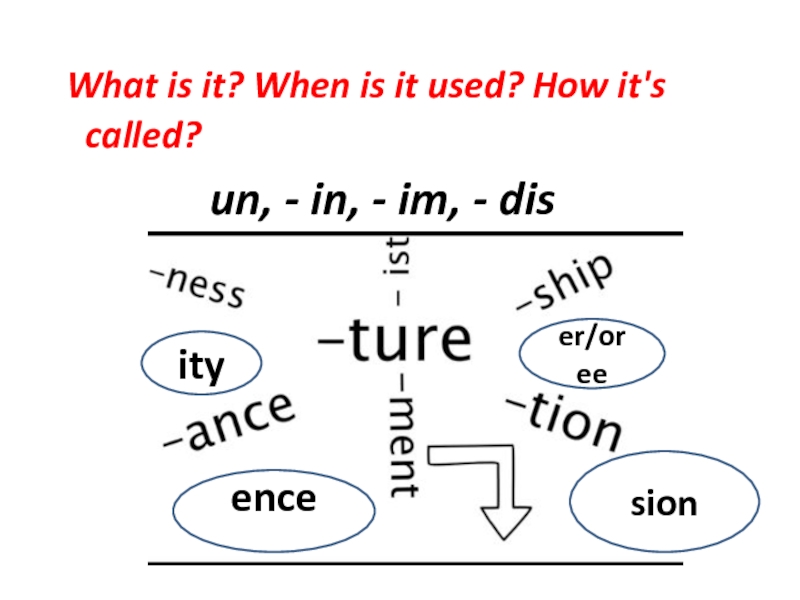
Слайд 2Word formation
How to build words
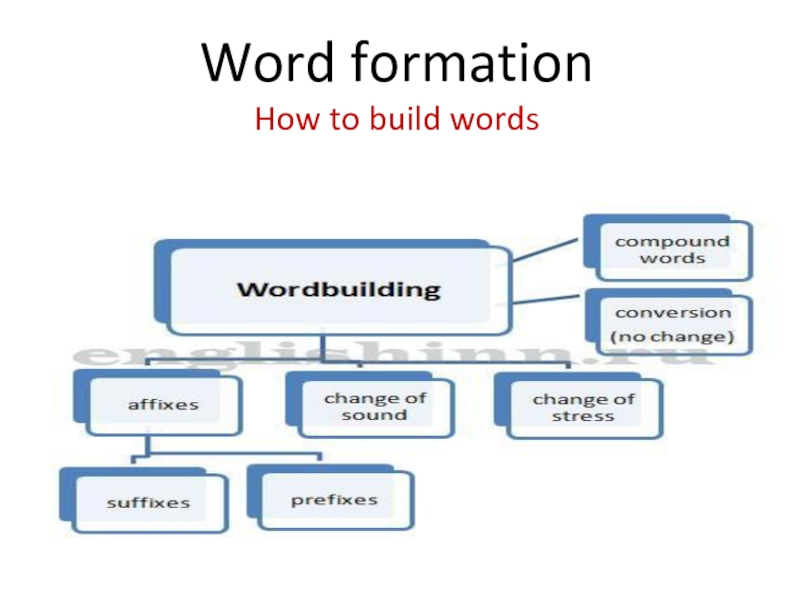
Слайд 3
Practice your rules
What verbs are these nouns formed? Improvement, achievement, population, situation, decision
improvement
improve
achievement
achieve
population
populate
situation
Situate
decision
decide
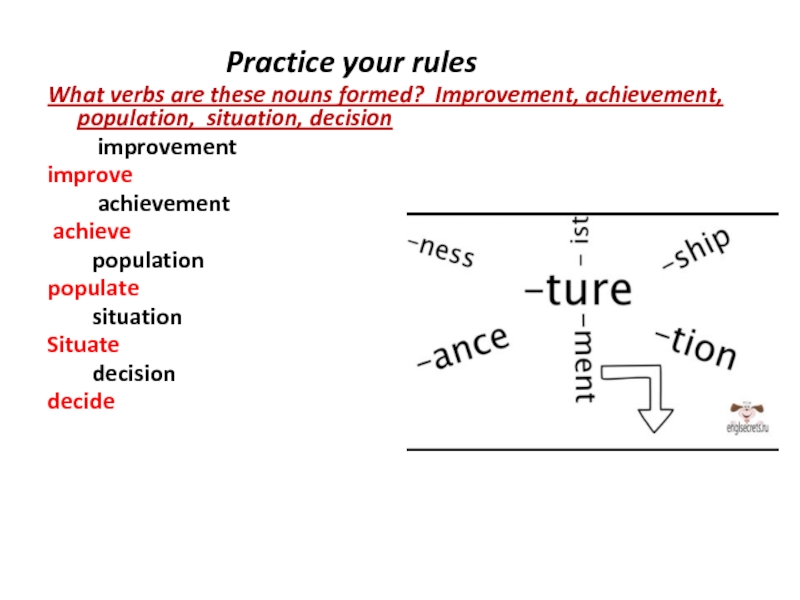
Слайд 4
Practice your rules
What adjectives are these nouns formed? Intelligence, silence, confidence, flexibility, loyalty, sadness
intelligence
intelligent
silence
silent
confidence
confident
flexibility
flexible
loyalty
Loyal
sadness
sad
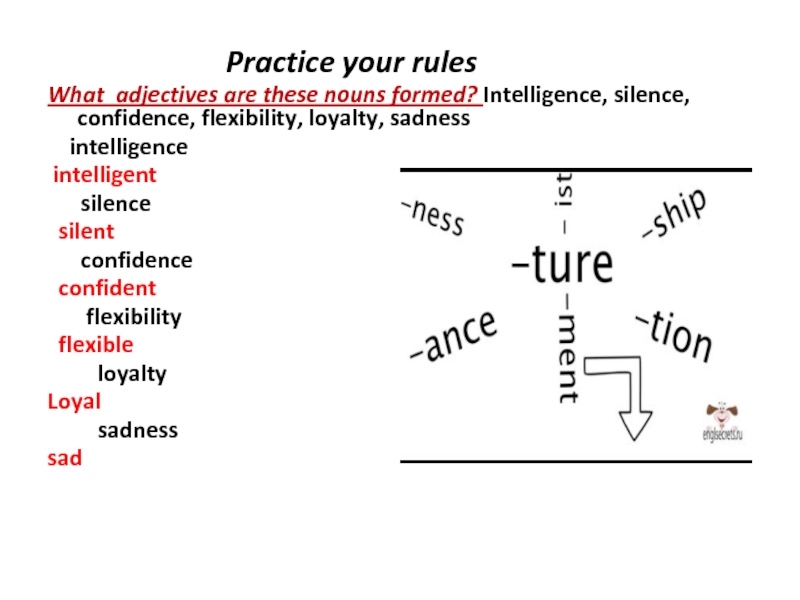
Слайд 5
Prefixes
un, — in, — im, — dis
Happy Patient
Honest Agree
Fair Correct
Tidy Appear
Usual Possible
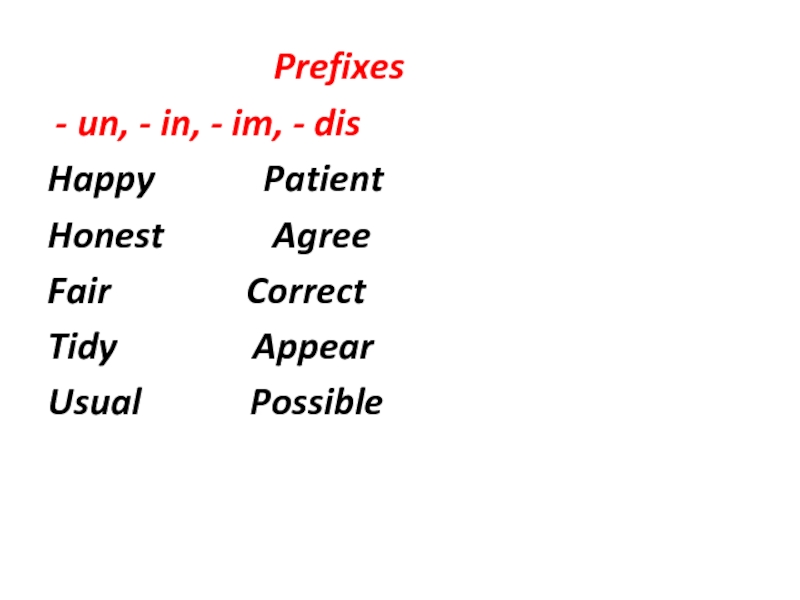
Слайд 6 un, — in, — im, — dis
ity
er/or
ee
ence
sion
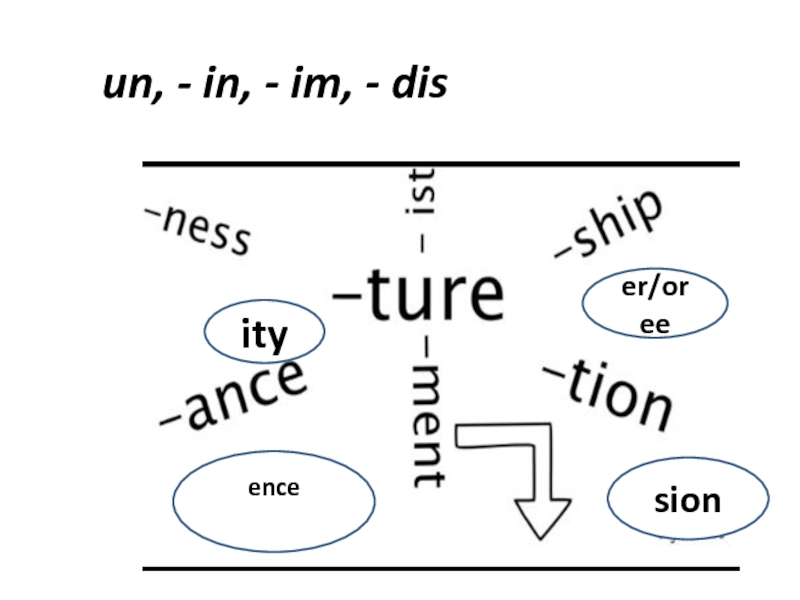
Слайд 7-ance
Important-importance
er/or
To buy-buyer
To direct-director
To visit – visitor
To work-worker
Er/ee
To employ – employer/employee
To
pay – payee
To address — addressee
Ship
Citizen-citizenship
Partner – partnership
Relation — relationship
Ist
Humor – humorist
Science – scientist
Art — artist
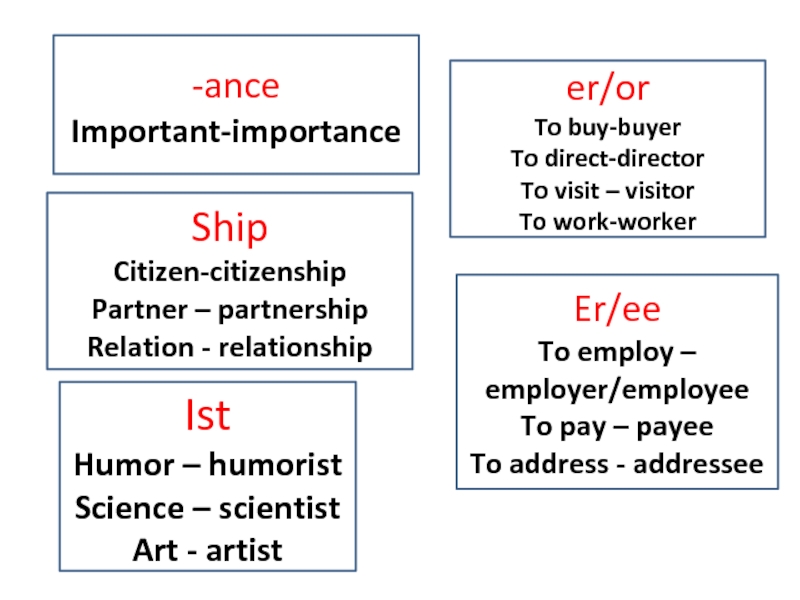
Слайд 8
Form nouns from verbs, adjectives and nouns
Improve –
Populate –
Decide
–
Silent –
Flexible –
Sad –
Important –
Partner –
Art –
teach —
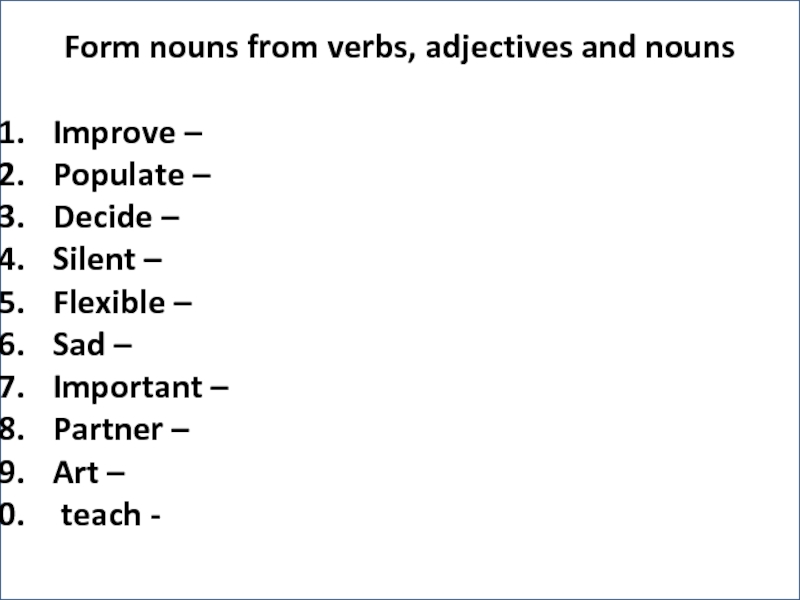
Слайд 9
Form nouns from verbs, adjectives and nouns
Improve – improvement
Populate – population
Decide
– decision
Silent – silence
Flexible – flexibility
Sad – sadness
Important – importance
Partner – partnership
Art – artist
teach — teacher
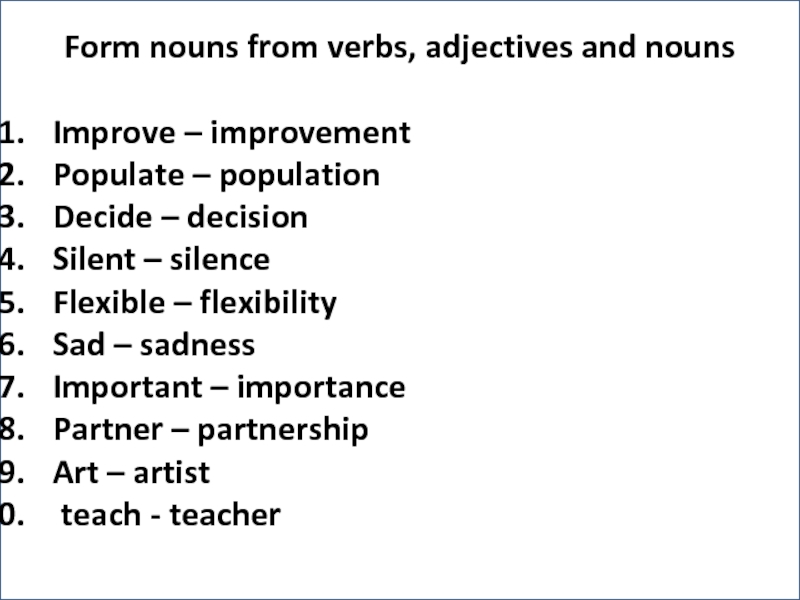
Слайд 10He achieved a great………(achieve)
He made the right……..(decide)
It is difficult……..(situate)
Keep……….(silent)
The………..must be………(lead/confidence)
She has
a ………….schedule(flexibility)
He wants to be a ……….(science)
They have a difficult……….(relation)
He doesn’t like to wait. He is an……….person. (patient)
I can’t trust him. He is ………person (honest)
Complete the sentence with the appropriate words.
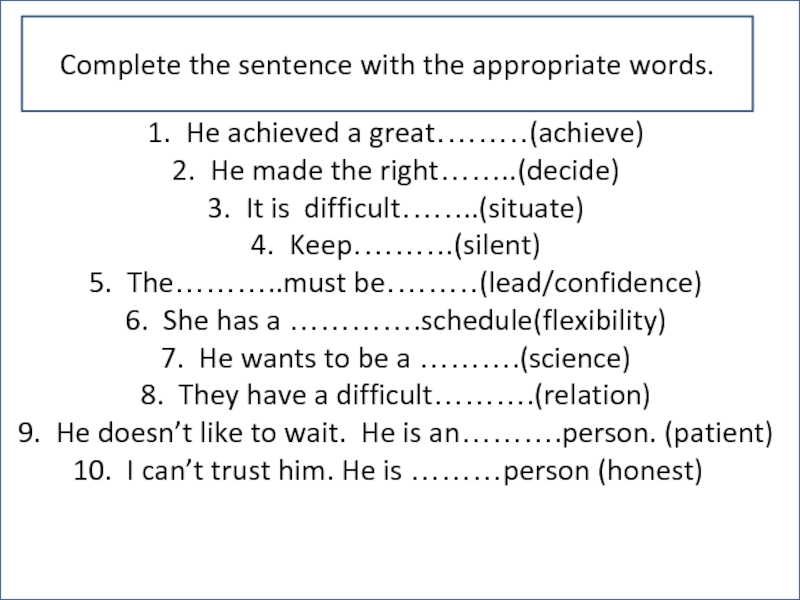
Слайд 11Cinquain
1 line — one noun expressing the main theme of the
lesson.
2 line — two adjectives expressing the main idea.
3 line — three verbs describing actions within the theme.
4 line — a phrase that carries a certain meaning.
5 line — the conclusion in the form of a noun (association with the first word).
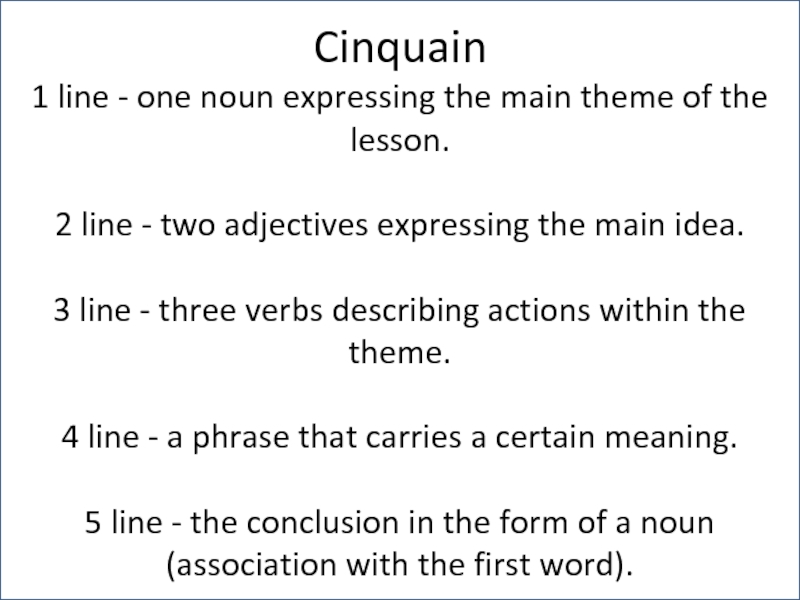
Слайд 12Answer the questions
What did you study in the lesson?
Where is it
used?
What did you do in the lesson?
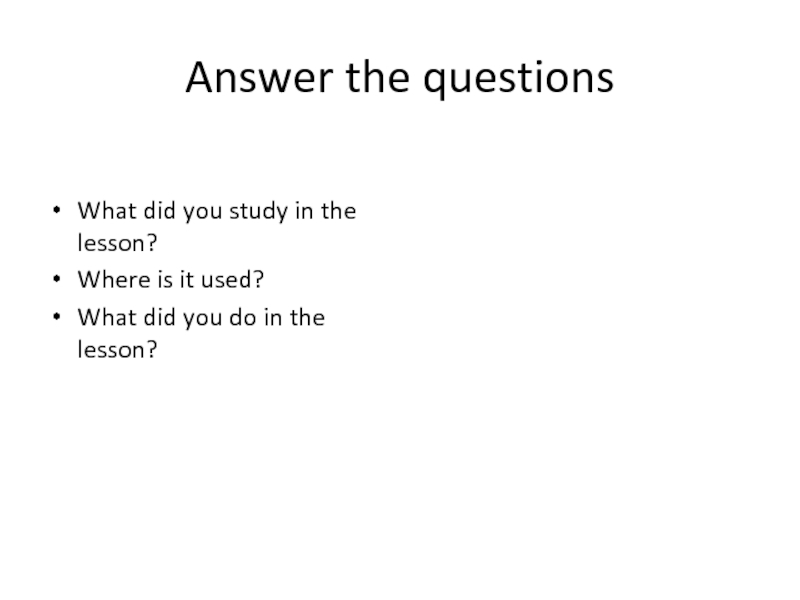
Слайд 13What
What would you like the most in the English lesson?
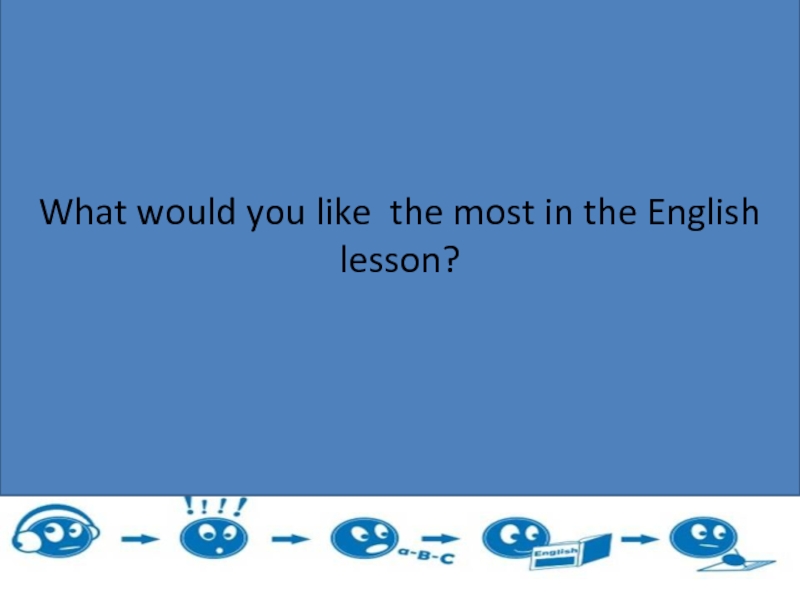
Слайд 14english secret.ru
Правила чтения в английском языке
Правила чтения в английском языке
Правила чтения
суффиксов английских имен существительных
Непроизносимые английские согласные

Слайд 15
Circle the odd one out.
1. Unimportant, unfriendly, understand
2. Unkind, united, uncool
3. Disappear, disagree,disco
4. immortal, imagine
5. Information, informal, incorrect, irregular
6. Misspell,misunderstand,mist
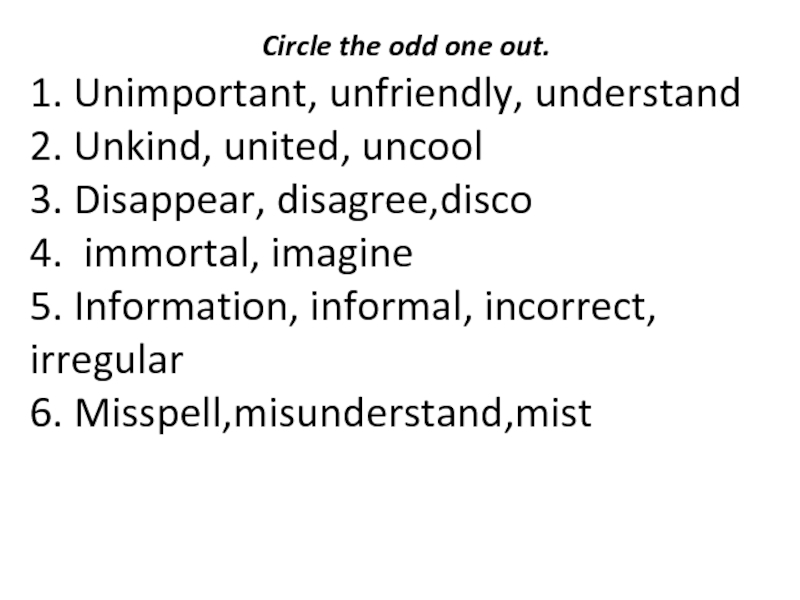
Слайд 16Make up as many words as possible by adding prefixes and
suffixes to the base.
possible
polite
agree
like
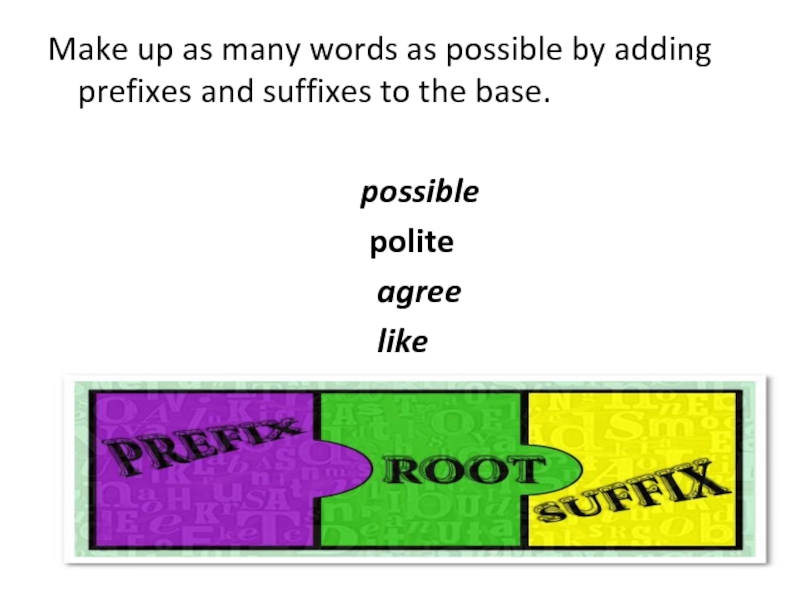
Слайд 17
Possible — impossible (невозможный), possibility (возможность), impossibility (невозможность)
Polite — impolite (невежливый),
politeness (вежливость), impoliteness (невежливость)
Agree — disagree (не соглашаться), agreement (соглашение), disagreement (расхождение),
Like — dislike (не любить), likeness (сходство), unlikeness (несходство), unlike (непохожий)
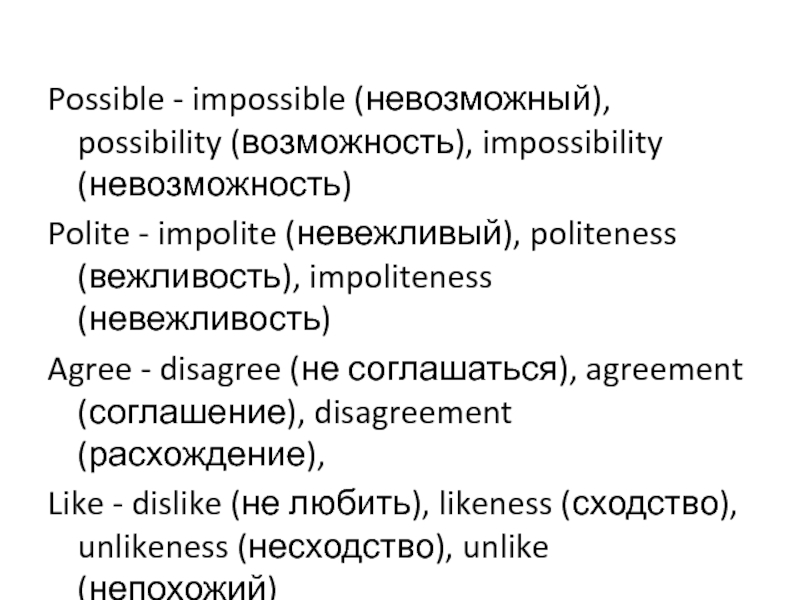
Слайд 18What words do these words come from?
Discussion
Incorrect
Collection education
Argument Unreal
Dishonest Unlucky
Dislike Disconnect
Impossible Impatient
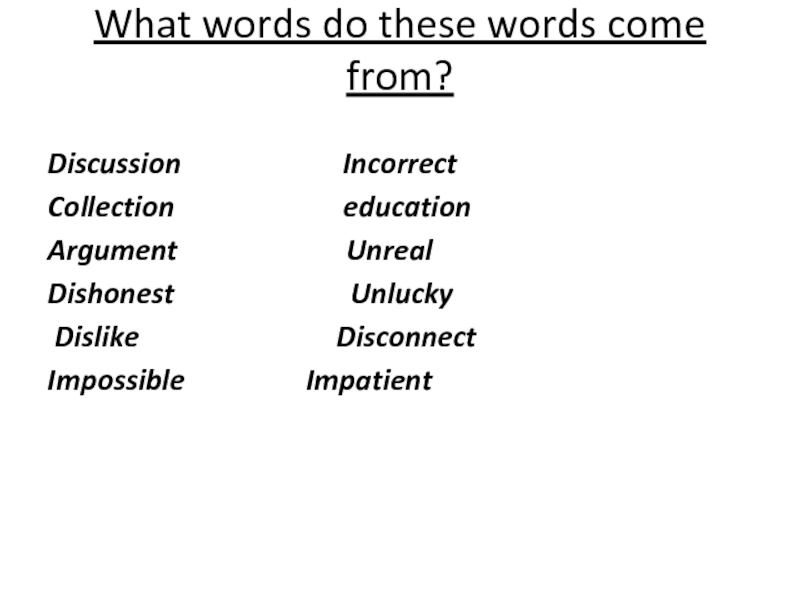
Слайд 19 Add negative prefixes to the following words.
Mobile happy
patient expected
comfortable different
direct responsible
known legal
pleasant popular
possible visible
polite usual
logical regular
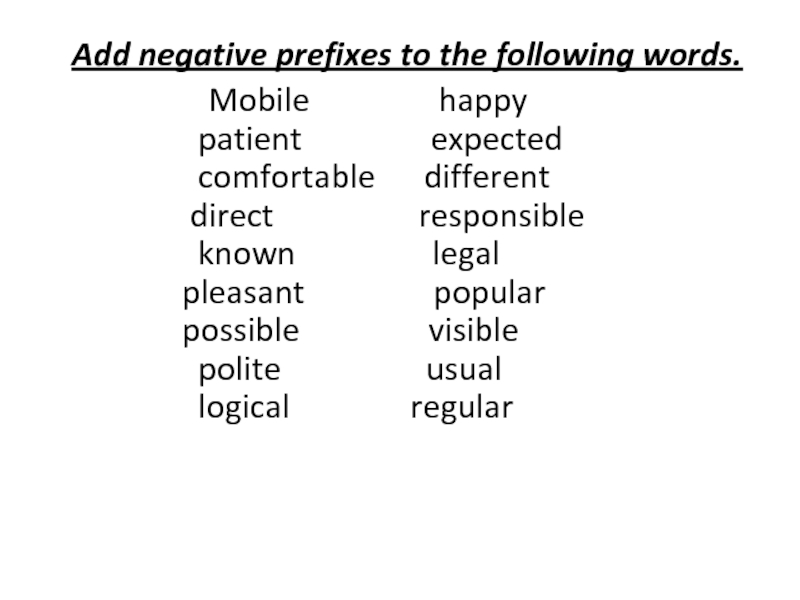
Слайд 20
Check yourselves
immobile unhappy
impatient unexpected
uncomfortable indifferent
indirect irresponsible
unknown illegal
unpleasant unpopular
impossible invisible
impolite unusual
illogical irregular
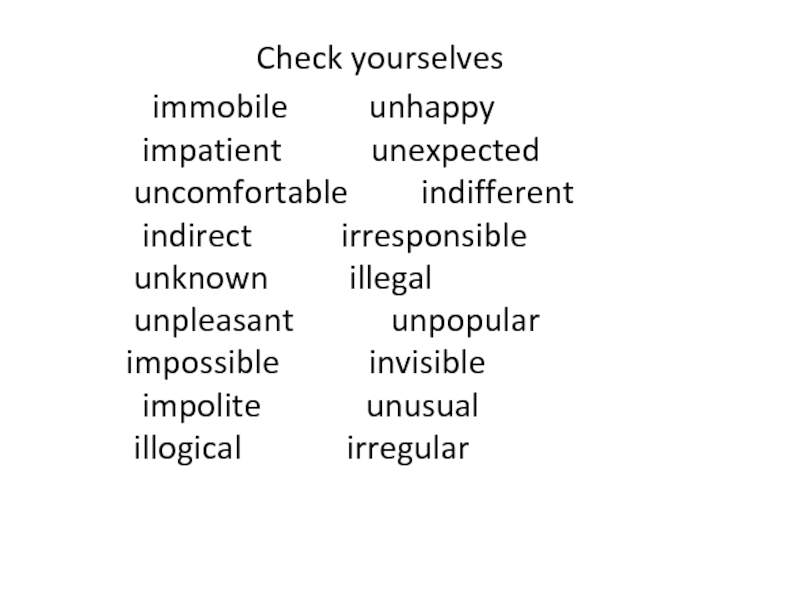
WORD FORMATION
EVACUATE
EXIST
OFFEND
WORD FORMATION
EVACUATION
EXSISTANCE
OFFENCE
Phrasal verb
«call»
- CALL IN=VISIT FORMALLY, ATTEND
- CALL OFF=CANCEL, ABOLISH, NULLIFY, ANNUL
- CALL OUT= ASK FOR HELP, INQUIRE ASSISTANCE
- CALL FOR=ADDRESS TO SOMEBODY
- СALL ON=VISIT,COME TO SOMEONE’S PLACE
LITTER
RUBBISH
SMOKE AND FOG
INACTIVE AND DISAPPEARED
CREW AND STAFF
MISS AND LOSE
Fill in: on, in, out, by.
- The surprise for my birthday was wonderful ! My best friends left me … amazement.
- There is no point in (make) panic. In this place we are … of danger.
- Victims of a big fire hope (get) new homes in a short term. Their village disappeared … flames.
- I can’t help (agree) with animal specialists that snake is quite unpredictable animal. I can’t suggest you (buy) it to your child as a pet. It is dangerous… nature.
- What …earth is going on? I told that you should avoid (use) this electrical equipment without permission.



